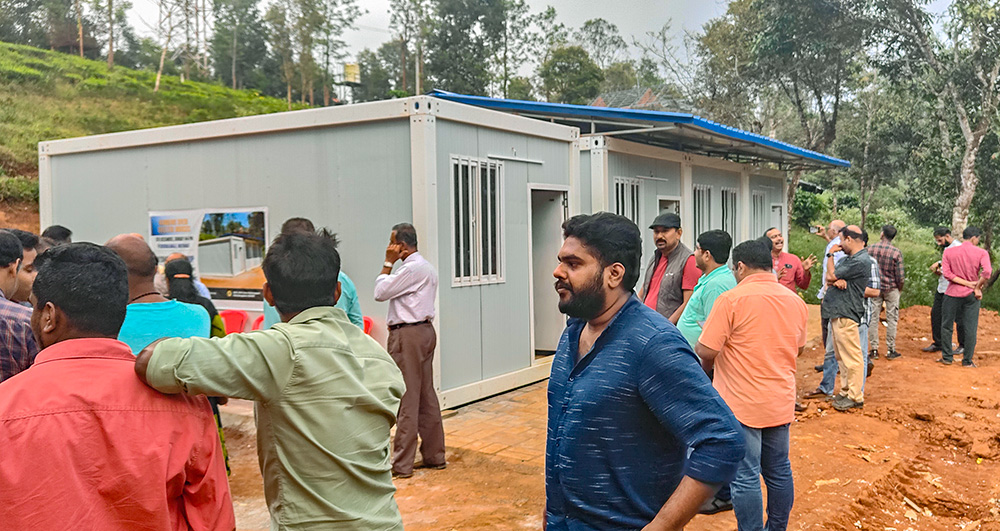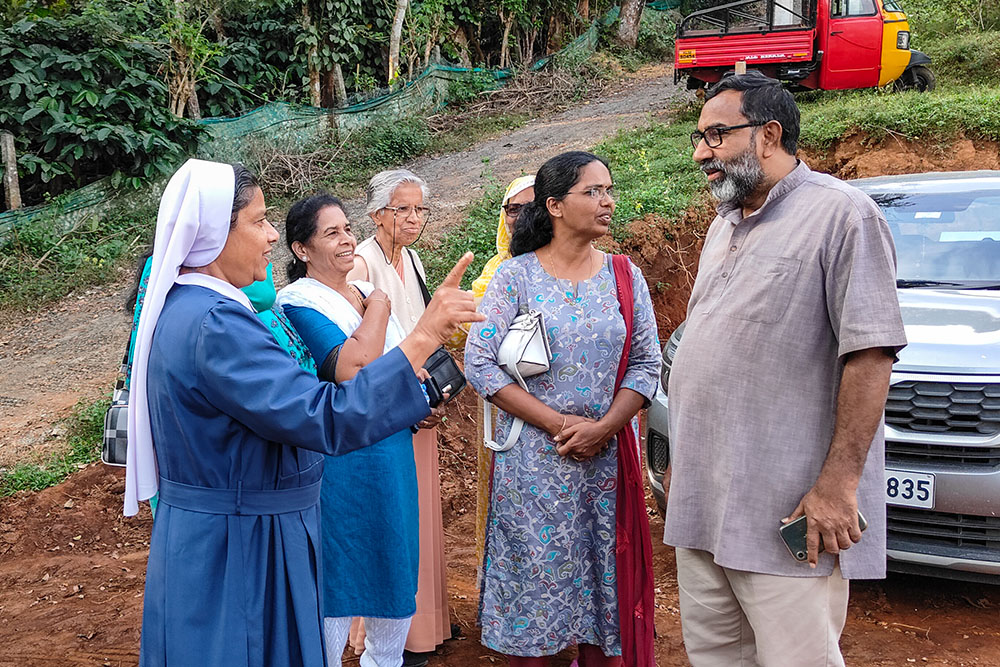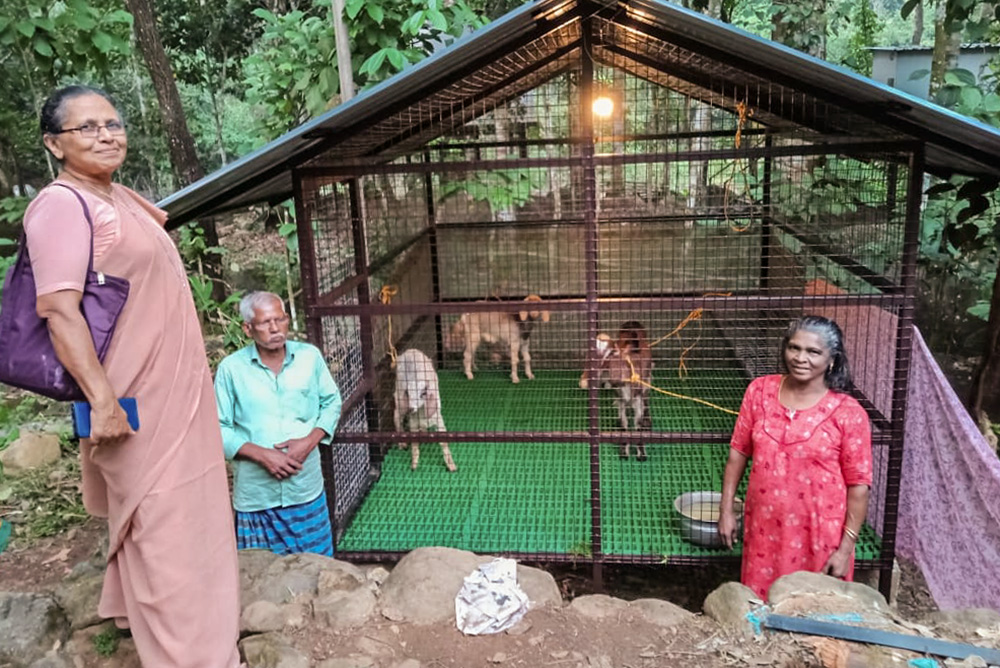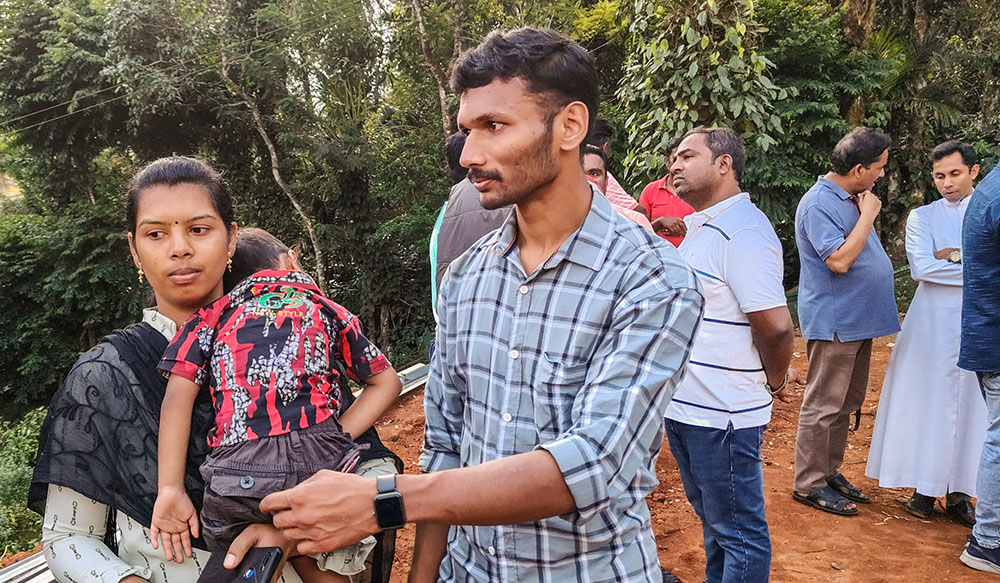
Beneficiaries gather around the temporary houses being handed over to the landslide victims of Wayanad in the southwestern Indian state of Kerala. (Thomas Scaria)
Women religious congregations are assisting church groups in the second phase of rehabilitation of the landslide survivors in the Wayanad district of Kerala, a southwestern Indian state.
"In the first phase, our focus was on relief and counselling for the survivors, and in the second, we provided them shelter and livelihood," said Cluny Sr. Lissy Alyarath, a member of the Wayanad Relief Committee, headed by Claretian Fr. George Kannanthanam.
The committee under the banner of the Claretian Project Vision on Dec. 8 handed over six temporary houses to the families at Chooralmala, one of the worst affected villages.
Kannanthanam said the committee is a network of church-based nongovernmental organizations, religious congregations and like-minded individuals who were committed to help the landslide victims.
"At least some six religious congregations of women are actively involved in the disaster management committee at various phases of relief and rehabilitation," he told GSR Dec 13.
More than 400 people died and hundreds became homeless in the July 30 landslides that destroyed schools, government offices, community buildings and more than 1,500 hectares of agricultural land.
Kannanthanam also said that many in his committee were part of previous disaster management projects that helped the victims of the Indian Ocean tsunami in 2004, Nepal earthquake in 2015 and Kerala floods in 2018.

Sr. Lucia Paravananickal (left) of the Sisters of Charity of St. Vincent De Paul and Providence of Gap Sr. Mary Philip (third from left) interact with Claretian Fr. George Kannanthanam during the house handing-over ceremony at Chooralmala in the Wayanad district of Kerala, southwestern Indian state. (Thomas Scaria)
The committee imported materials for the houses from China with the help of the Claretian mission there. The materials were then assembled at leased land adjacent to St. Sebastian's Church, Chooralmala. "Once the materials are ready, it takes less than a month to set up the houses," said Chooralmala parish priest Fr. Jibin Vattukulam.
T. Siddhique, a Muslim who represents the area in the Kerala Legislative Assembly, handed over the keys of the new temporary houses. He said he admired the church expediting the housing projects when the government was in the planning stage.
The Kerala government has shortlisted more than 1,000 Wayanad families to receive houses, but the plan will take three years to complete, the legislator added.
Alyarath said the church groups have gone ahead with the housing projects even as the federal and state government indulged in a blame game.
Committee member Sr. Aneesha Arackal, of the Sisters of the Destitute, said people are upset over the slow process of the government rehabilitation programs and political parties bargaining in the name of the landslide victims.
Prime Minister Narendra Modi, who visited Wayanad and met the survivors Aug. 10, promised federal aid to the victims, but the Kerala government says no such help has come even four months after the tragedy.
The government declared it a "national disaster of severe nature" on Dec. 30, acknowledging its significant impact.
At the same time, the Kerala government has collected donations from the public to help the Wayanad victims, but no project has started, Alyarath said.
She said the church groups could help the victims mainly because of the nuns.
Five women congregations serving the affected region have formed a network different from the committee to identify families for the church groups.
Advertisement
One such group, Philokalia Foundation, on Dec. 5 presented five permanent houses to the Wayanad survivors.
Maria Joseph, a Muslim convert turned Catholic evangelist who heads the foundation, told GSR Dec. 18 that his group handed over 14 permanent houses within four months of the landslide and another 15 houses will be ready by mid-January.
Joseph said the recipients of the group's first house was referred by Sr. Christina Kunnel, member of the Society of Kristu Dasis, a diocesan congregation.
He said several beneficiaries were also identified by nuns from various congregations, and their applications were collected from a relief camp at St. Joseph's School, managed by the Bambina sisters.
Kunnel said they are on a threefold mission in Wayanad — education, counseling and livelihood programs, besides working with groups like Philokalia.
"We want to ensure that no child discontinues studies. We also offer youth vocational training and livelihood support," she told GSR.
The nuns have also supported the Kerala Catholic Bishops' Council and the dioceses of Mananthavady and Calicut in their housing projects.

Good Shepherd Sr. Prabha Charalel hands over livestock to landslide-affected families in the Wayanad district of Kerala, southwestern India. (Courtesy of Shirly Joseph)
The bishops' council has identified land for 100 houses for the victims, irrespective of their caste and creed.
Responding to pressure from the affected population, the state government on Jan. 2 announced it would set up two townships with houses and other infrastructure facilities like a school, health center and government offices.
Sr. Shirley Joseph, a member of the local network who turned two schools managed by her Sisters of Charity of St. Bartolomea Capitanio congregation into relief camps immediately after the disaster, said they have joined the second phase of rehabilitation.
"We could not work directly with the Wayanad Relief Committee, but our network addresses the victims' issues collectively," she told GSR.
Her schools have waived the fees of children from affected families.
Her network now trains the survivors in vocational skills, besides providing them machinery and toolkits. It has also given families livestock such as cows, goats and sheep as a livelihood assistance.
Meanwhile, the relief committee members explained why they built temporary houses first.
"The survivors required immediate support to resettle in life," said St. Josephs of Tarbes Sr. Mary Mascarenhas.

Lijo Thekkilakattil with his wife and son during the handing of keys to his new temporary house at Chooralmala in Wayanad, Kerala, southwestern India (Thomas Scaria)
"Permanent houses will take 2-3 years and we cannot expect them to stay in the government-allotted rented houses that are far from their villages," the octogenarian nun told GSR.
The temporary houses bring the survivors "back to work and back to normalcy," explained Mascarenhas, who has worked with Kannanthanam in the earlier disaster management projects.
The survivors sounded happy to receive the temporary houses.
Lijo Thekkilakattil, who lost his parents in the disaster, was among the six beneficiaries. "This was a great support that came at the right time," the father of a 3-year-old son told GSR.
He said he is grateful to the church for standing with him "all throughout our loss and grief, and we hope to rebuild our lives."
Jijith Padipurackal, another beneficiary, said the temporary house is near his farms, "so that we can continue to make our living."
The government-allotted rented house, he added, was some 20 miles from his village.
Sr. Lucia Paravananickal of the Sisters of Charity of St. Vincent De Paul, who attended the key ceremony, said the temporary houses are a good example of an interim help. "The government can also promote the temporary homes concept," she added.






